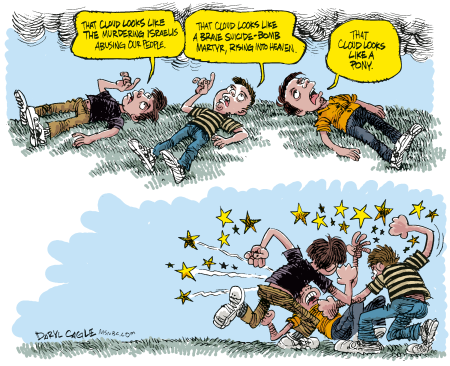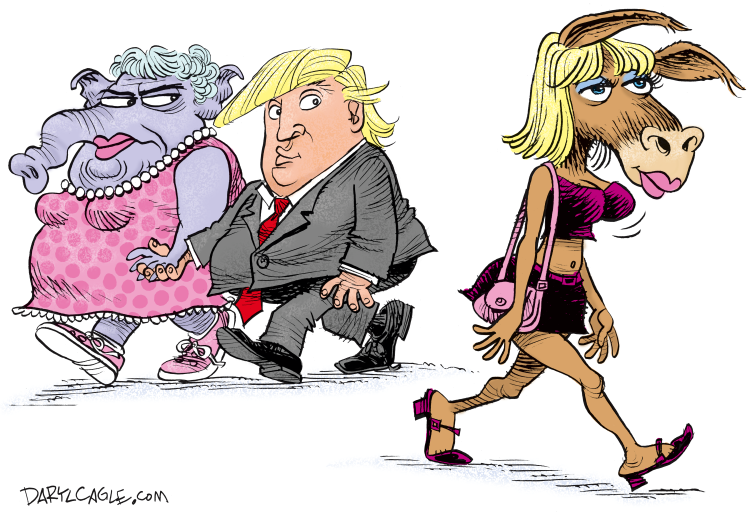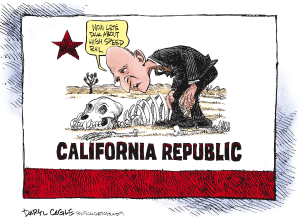
Arab Spring Bath Tub Obama
 Last March I wrote about Palestinian political cartoonist Mohammed Sabaaneh being imprisoned by Israeli authorities for no good reason, except the unstated reason that they didn’t like his cartoons which were critical of Israel. I’m happy to announce that he was just released! Here is a nice article from The World.
Last March I wrote about Palestinian political cartoonist Mohammed Sabaaneh being imprisoned by Israeli authorities for no good reason, except the unstated reason that they didn’t like his cartoons which were critical of Israel. I’m happy to announce that he was just released! Here is a nice article from The World.
At that time I asked readers to send a letter to the Israeli Ambassador calling for Sabaaneh’s release. Cartoonists around the world made the same requests of the Israeli ambassadors in their countries – I never heard of any of them getting a response. I got no response.
Great to have you back, Mohammad!

On the occasion of President Obama’s visit to Israel, most Americans think of the dramatic changes happening in the Middle East and the threat Iran poses to Israel. The world is a frightening place for Israel — but American cartoonists have something else on their minds, a Palestinian cartoonist who is jailed in Israel for no apparent reason. Here is a letter I wrote to Israel’s Ambassador to the United States, Michael Oren.
Dear Ambassador Oren,
I am writing to urge Israeli authorities to release a Palestinian political cartoonist, Mohammad Saba’aneh, who was jailed by the Israeli Defense Forces on February 16 at a border crossing between the West Bank and Jordan. He is being held without charge and is denied access to an attorney. Under Israeli law, Muhammad may be held indefinitely without charge. Only Israeli authorities know why he is imprisoned.
Mohammad is a cartoonist for Al-Hayat al-Jadida, the official newspaper of the Palestinian Authority, and he works at the Arab American University in Jenin on the West Bank. He is a respected cartoonist; he is not a terrorist or a criminal. Arab cartoonists often draw ugly, racist, offensive cartoons about Israel, but Mohammad’s cartoons are not among those; his work, although critical, is more balanced and artful.
I met Mohammad in 2010, when the U.S. State Department sent him to our Association of American Editorial Cartoonists convention in Florida, where he got to meet many of his American colleagues. Mohammad told me he was a fan of my work; he is a charming guy, eager to show his own cartoons to all of his new friends. Mohammad is active in the global cartooning community and cartoonists around the world are closely following the story of his plight in Israel.
I run a small business, Cagle Cartoons, Inc., that syndicates the work of cartoonists from around the world to over 850 subscribing newspapers, including half of the daily, paid-circulation newspapers in America. Among the cartoonists we distribute is Yaakov Kirschen, the cartoonist who draws Dry Bones for the Jerusalem Post; Yaakov’s cartoons run in Jewish newspapers throughout the United States. Our American editorial cartoonists are great supporters of Israel, in contrast to cartoonists from the rest of the world who harshly criticize Israel. The contrast is easy to see as editorial cartoons reflect world opinion. American cartoonists are Israel’s most visible supporters, and my own small business is the leader in distributing these views for America and the world to see.
It seems clear that Mohammad has been jailed to chill his cartoons that are critical of Israel. Instead, this ugly incident risks chilling Israel’s most visible supporters in America’s press at a time when Israel needs our support more than ever.
American cartoonists like to see Israel as a champion of democracy and press freedom in a hostile Middle East — Mohammad’s case undermines that perception and seems to be a clumsy attempt to silence the press. This incident makes Israel appear to be no better than its repressive neighbors.
I’m writing to you in the hope that you will urge the authorities in Israel to release Mohammad, return him to his family and allow us to again see Israel as a democracy that respects a free press.
Truly, Daryl Cagle
Daryl Cagle is a cartoonist who runs the CagleCartoons.com newspaper syndicate distributing editorial cartoons to more than 850 newspapers around the world including the paper you are reading now; he is a past president of the National Cartoonists Society. Comments to Daryl may be sent to [email protected]. Read Daryl’s blog at www.cagle.com/daryl.
Please use the cartoon posted with this column. It’s by the jailed Mohammad Saba’aneh. Attribution should be to Mohammed Saba’aneh, Cartoon Movement.
Daryl’s Letter to Israel’s Ambassador
TELL ISRAEL’S EMBASSY TO FREE SABA’ANEH
TWEET #FREECARTOONIST TO ISRAELI AMBASSADOR OREN
Here is my letter to Israel’s Ambassador …
March 16, 2013
Daryl Cagle
Cagle Cartoons, Inc.
Ambassador Michael Oren
Embassy of Israel to the United States
3514 International Dr. N.W.
Washington, DC 20008
Dear Ambassador Oren,
I am writing to urge Israeli authorities to release a Palestinian political cartoonist, Mohammad Saba’aneh, who was jailed by the Israeli Defense Forces, on February 16th, at a border crossing between the West Bank and Jordan. He is being held without charge and is denied access to an attorney. Under Israeli law, Muhammad may be held indefinitely without charge. Only Israeli authorites know why he is imprisoned.
Muhammad is a cartoonist for Al-Hayat al-Jadida, the official newspaper of the Palestinian Authority, and he works at the Arab American University in Jenin on the West Bank. He is a respected cartoonist; he is not a terrorist or a criminal. Arab cartoonists often draw ugly, racist, offensive cartoons about Israel, but Muhammad’s cartoons are not among those; his work, although critical, is more balanced and artful.

Click on the photo above to read more about Saba’aneh’s plight from the Cartoonists Rights Network site.
I met Muhammad in 2010, when the U.S. State Department sent him to our Association of American Editorial Cartoonists convention in Florida, where he got to meet many of his American colleagues. Muhammad told me he was a fan of my work; he is a charming guy, eager to show his own cartoons to all of his new friends. Muhammad is active in the global cartooning community and cartoonists around the world are closely following the story of his plight in Israel.
I run a small business, Cagle Cartoons, Inc., that syndicates the work of cartoonists from around the world to over 850 subscribing newspapers, including half of the daily, paid-circulation newspapers in America. Among the cartoonists we distribute is Yaakov Kirschen, the cartoonist who draws Dry Bones for The Jerusalem Post; Yaakov’s cartoons run in Jewish newspapers throughout the USA. Our American editorial cartoonists are great supporters of Israel, in contrast to cartoonists from the rest of the world who harshly criticize Israel. The contrast is easy to see as editorial cartoons reflect world opinion. American cartoonists are Israel’s most visible suporters, and my own small business is the leader in distributing these views for America and the world to see.
It seems clear that Muhammad has been jailed to chill his cartoons that are critical of Israel. Instead, this ugly incident risks chilling Israel’s most visible supporters in America’s press, at a time when Israel needs our support more than ever.
American cartoonists like to see Israel as a champion of democracy and press freedom in a hostile Middle East – Muhammad’s case undermines that perception and seems to be a clumsy attempt to silence the press. This incident makes Israel appear to be no better than its repressive neighbors.
I’m writing to you in the hope that you will urge the authorities in Israel to release Muhammad, return him to his family and allow us to again see Israel as a democracy that respects a free press.
Truly,
Daryl Cagle
Editorial Cartoonist
President, Cagle Cartoons, Inc.
—————————————————————
Want to hear more about Mohammad Saba’aneh? An interesting audio report from The World, including an interview with my Israeli cartoonist buddy, Uri Fink, is posted below. Here is another recent report about Saba’aneh. Here is a nice blog that follows the case at Cartoon Movement, including cartoons drawn in support of Saba’aneh.
Synchronized Campaign Swimming

Israel-Monsters and Arab Cartoonists

The conflict between Israel and the Palestinians still looms large in political cartoons around the world, with an endless flow of cartoons from Arab countries showing monster-Israel assaulting, eating, crushing or somehow decimating the poor Palestinians. The dove of peace has been killed by Israel in every imaginable cartoon — crushed, squeezed, stabbed, burned, eaten. Poor bird.
The conflict goes on forever, long after every original cartoon idea has been exhausted. Americans don’t see much of these cartoons because they would be regarded here as anti-Semitic at worst, or as the same thing over and over, at best.
I just got back from a speaking tour in Egypt, Israel and the Palestinian territories. At my first event in Cairo I spoke to a group of Egyptian journalists who brought a newspaper up to me, proudly pointing out that in Egypt, editorial cartoons are often printed big and in color on the front page of the newspaper. The cartoon they showed me would make an American editor choke; it showed a spitting snake, in the shape of a Star of David; inside the snake/star was a peace dove, trapped behind bars, and above the snake, in Arabic, were the words, “It’s not about the bird flu, it’s about the swine flu.”
I explained that in America this cartoon would be regarded as anti-Semitic, and it would never be printed. The Egyptian journalists were emphatic, explaining to me that the cartoon was about Israel, not about Jews — an important distinction to them.
“Israel isn’t mentioned anywhere in the cartoon,” I said.
“But we all know the Jewish star is the symbol of Israel,” they responded.
I said, “It is a religious symbol. It is the same as if I took the star and crescent off of the flag of Pakistan and drew a similar cartoon, saying it was about Pakistan.” The journalists didn’t respond to me, my comment was such nonsense. I continued, “This cartoon seems to say that Jews are snakes and pigs.”
“No, no! We have lots of symbols for Israel that we all know, like the Jew with black clothes and a big hooked nose!” one of the Egyptian journalists insisted with some passion. “We like Jews, we just don’t like Israel!” The Egyptian journalists all continued to insist that I misunderstood what the cartoon meant.
I later had an opportunity to meet with a group of Palestinian editorial cartoonists in Gaza by teleconference. I sympathize with their plight; the poor cartoonists had almost no outlets to print their cartoons. One of the Gaza cartoonists showed me a cartoon he was proud of, showing an alligator eating a dove. I told him I didn’t understand the cartoon, and he explained that the alligator was blue, “which everyone understands to be Israel” and the dove had green wings, “which everyone understands to be Palestine.”
I tried to come up with some advice for the Gaza cartoonists on how to get their work published. I suggested that they could submit their work to international publications, but that it would be tough if every cartoon was another Israel-monster cartoon. The cartoonists responded to say that in Gaza, they are under siege, and they don’t care to draw anything else.
I suggested that the Gaza cartoonists need to coax Western editors into printing their cartoons, and they would do well to consider some other angles; for example, drawing about their personal experiences and day-to-day difficulties. Palestinian cartoons criticizing Hamas and Fatah are rarely seen and would get reprinted.
I explained to the Gaza cartoonists that when the Israel/Palestine conflict is big in the news, and we post cartoons about the topic on our site, our Web site (www.cagle.com) traffic goes down. Americans are not very interested in events that happen outside of America, especially when it is the same news story, year after year. I told them that the most popular topic ever on our site was Janet Jackson’s boob, and that our readers really like cartoons about cute puppies. Hearing this, the Gaza cartoonists stared at me blankly, and then urged me to organize an international exhibition of cartoons that highlight their plight at the hands of Israel.
I spoke with one West Bank Palestinian cartoonist, Amer Shomali, who lost his gig with his newspaper because he insisted on drawing cartoons critical of Fatah; he was so frustrated that he rented a billboard to post a Fatah cartoon that his newspaper refused to publish. The billboard was swiftly taken down.
I met an excellent West Bank cartoonist, Khalil Abu Arafeh who draws for Al Quds, the big newspaper in the West Bank; he makes his living as an architect. Another talented West Bank cartoonist, Ramzy Taweel, breaks the Israel-monster cartoon mold, drawing about everyday life in the West Bank; his cartoons are seen only by his friends on his Facebook page. Ramzy could use some more Facebook friends; I encourage everyone to befriend him.
It is tough to make a living as a cartoonist anywhere these days — especially tough when the world has grown weary of what you want to say, when a market for your work doesn’t exist where you live, and when passions run high.
The fact that there is still a market for cartoons about cute puppies and cats who like lasagna probably doesn’t make the Palestinians feel any better.
Daryl Cagle is a political cartoonist and blogger for MSNBC.com; he is a past president of the National Cartoonists Society and his cartoons are syndicated to more than 850 newspapers, including the paper you are reading. Daryl’s books “The BIG Book of Campaign 2008 Political Cartoons” and “The Best Political Cartoons of the Year, 2010 Edition” are available in bookstores now.
Israel Vs Hamas Shoot the Doggie

Carter and Hamas

Palestinian Kids

Hamas and Israel
















